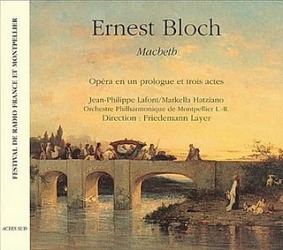Ernest Bloch – Macbeth (1997)
Ernest Bloch – Macbeth (1997)

CD1 1. Intro - Montpellier PO Languedoc-Roussillon/Friedemann Layer 2. 'D'ou Viens-Tu? Sur Le Champ De Bataille...' - Sophie Fournier/Hanna Schaer/Ariene Stamboulides 3. 'Oh Macbeth! Voyez Ces Creatures Fletries - Jacque Trussel 4. Macbeth! Plus Rapides Que La Grele...' - Jean-Philippe Marliere 5. Act I, Scene 1. Une Salle Dans Le Chateau De Macbeth: 'Et Puis...Elles Disparurent' - Jean-Philippe Lafont 6. Act I, Scene 1. Une Salle Dans Le Chateau De Macbeth: 'Seigneur, Le Roi Vient!' play - Franck Bard 7. Act I, Scene 1. Une Salle Dans Le Chateau De Macbeth: 'O Fidele Epouse De Mon Fidele Macbeth' - Christer Bladin 8. Act I, Scene 1. Une Salle Dans Le Chateau De Macbeth: 'Je Suis Vieux, Malcolm' - Christer Bladin 9. Act I, Scene 1. Une Salle Dans Le Chateau De Macbeth: 'Ah! Si La Chose Une Fois Faite' - Jean-Philippe Lafont 10. Act I, Scene 1. Une Salle Dans Le Chateau De Macbeth: 'Ecoute: Quand Duncan...' - Markella Hatziano 11. Act I, Scene 1. Une Salle Dans Le Chateau De Macbeth: Interlude Orchestral - Montpellier PO Languedoc-Roussillon/Friedemann Layer 12. Act I, Scene 2. La Cour Interieure Du Chateau: 'Il Est Plus De Minuit' - Jacque Trussel 13. Act I, Scene 2. La Cour Interieure Du Chateau: 'Est-ce Un Poignard?' - Jean-Philippe Lafont 14. Act I, Scene 2. La Cour Interieure Du Chateau: 'Les Portes Sont Ouvertes' - Markella Hatziano 15. Act I, Scene 2. La Cour Interieure Du Chateau: 'Frappe, Frappe, Dit Le Demon' - Marcel Vanaud 16. Act I, Scene 2. La Cour Interieure Du Chateau: 'Il Etait Donc Bien Tard L'ami?' - Jean-Philippe Marliere CD2 1. Act II: Une Salle D'apparat Dans Le Chateau De Macbeth: 'Ces Hommes Sont La?' - Jean-Philippe Lafont 2. Act II: Une Salle D'apparat Dans Le Chateau De Macbeth: 'Partis! Partis! Pour Toujours!' - Jean-Philippe Lafont 3. Act II: Une Salle D'apparat Dans Le Chateau De Macbeth: 'Qu'entends-Je Mylords?' - Jean-Philippe Lafont 4. Act II: Une Salle D'apparat Dans Le Chateau De Macbeth: 'Que Vois-Je? Plus De Place Pour Moi' - Jean-Philippe Lafont 5. Act II: Une Salle D'apparat Dans Le Chateau De Macbeth: 'O Macbeth! Pourquoi?' - Markella Hatziano 6. Act II: Une Salle D'apparat Dans Le Chateau De Macbeth: 'Oui, Je Tiens Dans Mes Bras' - Jean-Philippe Lafont 7. Act III, Scene 1. Une Caverne Tenebreuse: 'La Chatte A Miaule' - Sophie Fournier/ Hanna Schaer/Ariene Stamboulides 8. Act III, Scene 1. Une Caverne Tenebreuse: 'Que Faites-Vous Donc, Sorcieres Tenebreuses?' - Jean-Philippe Lafont 9. Act III, Scene 1. Une Caverne Tenebreuse: 'Macbeth! Macbeth!' - Mojtek Smilek/Annie Vavrille play 10. Act III, Scene 1. Une Caverne Tenebreuse: Interlude Orchestral - Montpellier PO Languedoc-Roussillon/Friedemann Layer 11. Act III, Scene 2. Une Salle Dans Le Chateau De Macbeth Avec Une Galerie Ouverte Sur La Forte De... - Markella Hatziano 12. Act III, Scene 2. Une Salle Dans Le Chateau De Macbeth Avec Une Galerie Ouverte Sur La Forte De... - Jean-Philippe Lafont 13. Act III, Scene 2. Une Salle Dans Le Chateau De Macbeth Avec Une Galerie Ouverte Sur La Forte De... - Jean-Philippe Lafont 14. Act III, Scene 2. Une Salle Dans Le Chateau De Macbeth Avec Une Galerie Ouverte Sur La Forte De... - Jean-Philippe Lafont 15. Act III, Scene 2. Une Salle Dans Le Chateau De Macbeth Avec Une Galerie Ouverte Sur La Forte De... - Choeur De La Radio Lettone Jean-Philippe Lafont - Macbeth Markella Hatziano - Lady Macbeth Jean-Philippe Marliere - Macduff Jacque Trussel - Banquo Christer Bladin - Duncan Philippe Georges - Lennox Marcel Vanaud - Le Portier Feijs Millers - Malcolm Andris Gailis - Le meurtrier Orchestre Philharmonique de Montpellier Languedoc-Roussillon Choeur de la Radio Lettone Friedemann Layer - conductor, 1997
Macbeth is an opera in three acts, with music by Ernest Bloch to a libretto by Edmond Fleg, after the eponymous play of William Shakespeare. Bloch composed the opera between 1904 and 1906, but it did not receive its first performance until November 30, 1910 by the Opéra-Comique Paris. Alex Cohen has written of quarrels within the cast that contributed to the opera's poorly received premiere. After the premiere, the opera was performed 15 times through January 1911, but then was withdrawn. Romain Rolland had studied the score and communicated his admiration to Bloch in June 1911.
Guido Gatti has compared elements of Bloch's opera to the music of Modest Mussorgsky. He has also written of the different treatments of the Macbeth story by Giuseppe Verdi and Bloch in their respective operas on the subject, with Verdi being more "realistic" and Bloch being more in keeping with the symbolist era in art at his time.
After the premiere production, the opera was staged in 1938 in Naples, but was then banned on orders of the Fascist government. Subsequently, the opera was produced in Rome in 1953, and in Trieste. Portions of the opera have been recorded with Heinz Rehfuss and Lucienne Devallier, with Ernest Ansermet conducting, and in another recording, with Inge Borkh. More recently, complete recordings conducted by Alexander Rumpf and Friedemann Layer have been produced. The University College Opera (of University College London) performed the English language premiere of Macbeth in the UK in March 2009.The opera was staged, in English, at the Juilliard School of Music in New York under the direction of John Houseman, in May 1973. P H Adler conducted; singers included L. Carlson, H. Barnsley, R. Termine, F. Burchinal, M. Li-Paz and W. White.
The story is essentially that of the Shakespeare play, with the five acts compressed to three. The opera contains seven tableaux, with the prelude comprising the first tableau, and each of the three acts containing two tableaux.
download: uploaded anonfiles mega 4shared mixturecloud yandex
Last Updated (Tuesday, 27 August 2013 19:52)








